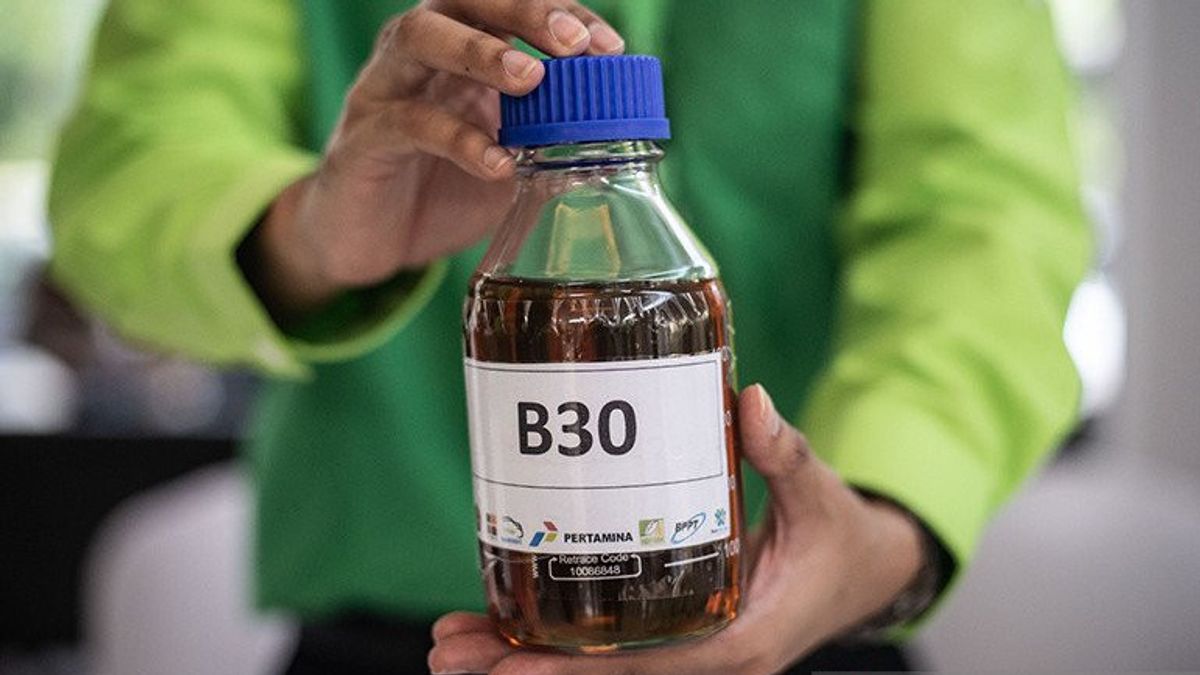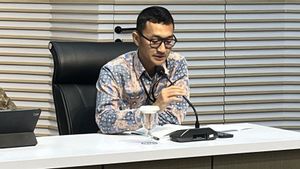JAKARTA - The use of B30 produced by the palm oil industry is an important part of Indonesia's efforts to reduce the use of diesel. Parliament encourages B30 to be used more widely by the community.
So far, greater use has been used in public transportation, not private vehicles. Therefore, the Council supports the increase in fuel supply using the CPO widely.
This increase is considered to reduce the consumption of public fuel by 80 percent in the form of Pertalite. Deputy Chairman of Commission VII Eddy Soeparno appreciated the use of B30 in the country.
"On the one hand, I appreciate the wider use for B30 fuel. This is certainly part of our efforts to reduce the use of diesel completely because there is a mixture of biodiesel in it," said Eddy in Jakarta, Tuesday, September 13.
"Therefore, we continue to encourage B30 to be increased, especially the supply so that distribution can be expanded again and the volume can also be increased for public consumption," said Eddy again.
Energy Watch Executive Director Mamit Setiawan on a different occasion assessed that all biodiesel programs are one of the government's progressive efforts in demonstrating the application of renewable energy in the country. According to him, there are two main things that Indonesia can achieve through this program.
"With this program, we will get two things. First, of course, it can reduce imports and diesel. Second, it must be one of the government's flagship programs in the context of the energy mix," he said.
The Ministry of Energy and Mineral Resources said that diversifying fossil energy with renewable energy is one of the concrete steps to reduce emissions. The target is that the energy mix in Indonesia by 2025 can reach 23 percent.
Although, Mamit acknowledged, the price of biodiesel economy still tends to be higher. Moreover, when the price of CPO has soared high due to various problems and market disruptions, it has an impact on biodiesel-forming materials, namely metylester fatty acids (fatty acid methyl ether/FAME).
Not to mention, Russia-Ukraine's war sentiment has also made world oil including CPO also increase. However, he is optimistic that this high diesel price phase will change and prices will fall.
"I think, as conditions begin to improve on the demand and supply sides, the possibility (biodiesel) will decrease in prices," he said.
Previously, the Directorate General of New Renewable Energy and Energy Conservation (EBTKE) of the Ministry of Energy and Mineral Resources (ESDM) revealed that the realization of the distribution of B30 until August 27, 2022 reached 6.4 million kiloliters (kl) or 63 percent of the allocation of 10.15 million k.
"This increase is in line with the increase in domestic diesel demand. And for 2022 to 27 August 2022, biodiesel has been distributed for the B30 program of 6.4 million kl or 63 percent of the allocation target of 10.15 million kl," said Director General of EBTKE at the Ministry of Energy and Mineral Resources Dadan Kusdiana in Jakarta, last week.
In 2020 and 2021, the realization of the distribution of B30 for domestic needs is 8.4 million kl and 9.3 million kl. In addition, the Directorate General of EBTKE of the Ministry of Energy and Mineral Resources noted that foreign exchange savings from B30 implementation continued to increase. The details in 2020 amounted to Rp38.04 trillion, and increased to Rp66 trillion in 2021.
Based on a report by the Indonesian Biofuel Manufacturers Association (Aprobi) throughout January-July 2022, Indonesia has produced 6,520,184,250 kiloliters of biodiesel. Meanwhile, such large biodiesels are distributed at the domestic level which dominates 5,859,676,922 kiloliters, while the rest is intended for exports of 74,433,463 kiloliters.
Aprobi assessed that the mandatory 30 percent biodiesel or B30 had succeeded in reducing fuel imports in Indonesia. In 2020, Indonesia managed to cut diesel imports by US$3.73 billion or equivalent to Rp55.57 trillion (assuming Rp14,899/US dollar).
Meanwhile, in terms of the environment, the existence of B30 has also cut carbon emissions. Aprobi noted, during the implementation of B30 throughout 2020, biodiesel managed to reduce emissions by 24.6 million tons of CO2, or equivalent to 7.8 percent of the energy achievement target in 2030.
As of August 2022, the Directorate General of EBTKE of the Ministry of Energy and Mineral Resources set the Market Index (HIP) price for Nabati Fuel (BBN) Biodiesel Rp8,047/liter + transport costs. In comparison, the HIP BBN Biodiesel as of April 2022 had touched Rp15,559/liter + transport costs.
"Once again, at least biodiesel is the government's flagship program to pursue the energy mix target," explained Mamit.
In the future, he believes, the implementation of biodiesel will be more progressive, even in the near future the government is preparing for the implementation of B40. So far, he appreciates the development of biodiesel products in the country which are much better and getting better.
Mamit suggested that related parties improve biodiesel products to reduce the cost burden borne by consumers. The government can also develop this biodiesel product so that it can be used on many machines, not limited to land vehicles.
"Maybe (used) Pelni or train, I think this can continue to be tested from factories. In this case, the government must receive input from end users regarding problems, problems and find solutions so that they can be repaired (biodiesel)," he said.
The English, Chinese, Japanese, Arabic, and French versions are automatically generated by the AI. So there may still be inaccuracies in translating, please always see Indonesian as our main language. (system supported by DigitalSiber.id)
Most Popular Tags
#Prabowo Subianto #New Year #Mother's Day #nataru #NatalPopular
23 Desember 2024, 07:07










